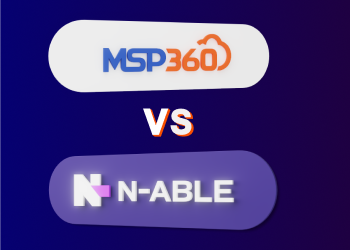Ransomware attacks are major threats for organizations across the board — but no two attacks are the same, in part because of the industry-specific challenges and risks that businesses face.
MSP360 vs Cove Backup: Comparison for MSPs and IT Professionals
Selecting a backup solution requires balancing functionality, cost, and reliability, especially for IT professionals and Managed Service Providers (MSPs) managing critical business data. In this article, we compare Cove Backup (formerly N-able Backup) and MSP360 Managed Backup, highlighting their strengths, weaknesses, and optimal use cases to guide your decision—whether you’re new to backup solutions or considering a Cove Backup alternative.
This comparison focuses on features critical for MSPs and IT departments, including pricing policy and cost planning, backup capabilities, storage options, and management console usability, helping you make an informed decision based on your organization’s needs.
Pricing Policy and ROI
Cove Backup
- Price Includes License and Limited Storage: Each license comes with built-in storage quotas—2 TB per server and 500 GB per workstation, as outlined in the Fair Use Policy. Of course, the storage price is implicitly included in the license, and you pay for this storage whether or not it is fully utilized.
- Extra Storage Purchased Separately: Additional storage usage is charged at approximately $20 per TB*, potentially leading to high costs as backup sizes grow.
- Annual Contract: Cove offers an annual contract, which results in a large financial commitment and limits MSPs’ ability to optimize costs.
- Reselling Underused Storage Quota: If some clients are underusing their storage quota, MSPs can redistribute or “resell” the unused quota to other clients. However, if all clients are underusing storage, the MSP still pays for the full storage allocation.
*According to Reddit users’ comments.
MSP360 Managed Backup
- License per endpoint, Volume Discounts: MSP360 licenses do not include storage, allowing for clear and transparent cost planning. License discounts are available for MSPs with large-scale deployments.
- Flat Storage Price, with Multiple Options: MSP360 supports multiple storage destinations, including integrations with leading cloud storage providers like AWS, Wasabi, Backblaze B2, Microsoft Azure, Google Cloud Platform, and on-premises solutions. Pricing starts at just $5.99/TB with MSP360 Storage powered by Wasabi. Learn more about other storage options from the storage comparison table.
- Monthly Subscription With Trial Period: MSP360 offers monthly subscription options and trial periods for backup service and integrated storage options.
- Scalable, Cost-Effective Storage: Each client incurs storage costs proportional to their actual usage.
Backup and Recovery Capabilities
Cove Backup
- Cloud-First Backup: Designed primarily for cloud-based incremental backups, Cove supports file-level, application-aware, and system state backups.
- Limited Customization: Retention policies and backup schedules are less flexible compared to MSP360.
- Microsoft 365: Covers backup for Microsoft 365, including Exchange Online and OneDrive, but does not extend to Google Workspace.
MSP360 Managed Backup
- Versatile Backup Options: Supports file-level, application-aware (SQL, Exchange), system state, and image-based backups.
- Custom Retention Policies: Provides granular control over backup schedules and retention policies, allowing MSPs to meet compliance requirements.
- On-Demand Restores: MSP360 allows full control over recovery points and data versions.
- Microsoft 365 and Google Workspace: Comprehensive support for backing up and restoring Microsoft 365 services (Mail, OneDrive, Contacts, Calendar, SharePoint, and Teams) and Google Workspace (Gmail, Google Drive, Contacts, Calendar, and Shared Drives).
Storage Options
Cove Backup
- Built-In Cloud Storage: Cove includes proprietary cloud storage as part of its subscription plan. While this simplifies billing, it limits storage flexibility and may not meet all compliance requirements.
- No On-Premises Support: Cove does not support on-premises storage, which can be a disadvantage for organizations needing hybrid solutions.
- Vendor Lock-In Risk: Using Cove’s proprietary storage could create vendor lock-in, reducing flexibility for organizations that might want to switch providers.
- One Storage Option for All Data: Cove relies exclusively on its proprietary storage, offering no flexibility to differentiate between mission-critical data and secondary data storage tiers.
MSP360 Managed Backup
- Multi-Cloud Compatibility: MSP360 supports a broad range of storage providers, including AWS, Wasabi, Backblaze B2, Microsoft Azure, Google Cloud, and any S3-compatible storage.
- MSP360 Cloud Storage: Offers two storage options powered by Wasabi and AWS, featuring instant setup, flat pricing, and simple billing.
- Hybrid Flexibility: MSP360 supports both cloud and on-premises storage options, allowing organizations to tailor their solutions based on their infrastructure needs.
- Choice of Storage Providers: MSPs can choose storage solutions that will be optimal for each client, allocating premium storage for mission-critical data and cost-effective options for secondary data.
- Storage Tiers for Compliance Backups: When clients need long-term and cost-efficient storage for compliance reasons, MSPs can offer them options like AWS Glacier and Azure Archive Storage, starting at just $0.99 per Tb.
Management Console and UX
Cove Backup
- Cloud-Native Console: Cove provides a web-based management console designed for managing cloud-first backups.
- Streamlined Features: The interface is streamlined for simplicity but offers fewer advanced configuration options compared to MSP360.
- Limited Control: Cove lacks certain granular control features, which might not appeal to MSPs needing detailed customization.
MSP360 Managed Backup
- Unified Management Console: MSP360 provides a single, centralized console to manage all backups, monitor statuses, configure policies, and much more. It supports all product features with no extra costs.
- User-Friendly Interface: The platform is known for its intuitive interface, making it easy for MSPs and IT professionals to onboard new staff and manage backups without extensive training.
- Free Inclusion: MSP360’s management console is included in the license, with no separate fees.
- API Support: Offers extensive API capabilities for integration with other tools and custom automation.
Conclusion
Choosing between MSP360 Managed Backup and Cove Backup depends on your business priorities. MSP360 offers unmatched flexibility in storage, robust security features like immutability, and cost-efficient pricing, making it an excellent choice for MSPs managing diverse environments or seeking a Cove alternative. On the other hand, Cove excels in cloud-native simplicity and seamless integration with N-able’s ecosystem, making it suitable for organizations already committed to their tools.
Both platforms cater to distinct needs, and understanding your operational requirements will help you make the best decision for protecting your data and ensuring business continuity.
MSP360 vs Comet Backup: Comparison for MSPs and IT Professionals
If you're reading this article, you likely already understand what backup software is and why data protection is essential. Maybe you’re an IT professional or a Managed Service Provider (MSP) looking for an optimally functional, affordable, and reliable backup solution. Whether you are making this choice for the first time or looking for a suitable Comet Backup alternative, this article aims to help you make an informed decision.
News You Might’ve Missed. December 2023
What's new this month in the news for MSPs?
High-speed Amazon S3 Express One Zone goes live; new AWS cloud application monitoring features publicly available; Lazarus group shifting to new Telegram tactics; Microsoft exposes three OAuth-based hacking campaigns; Google starts urgent Chrome update to address critical vulnerability; and credit unions hit by new Citrix ransomware threat. Continue reading
News You Might’ve Missed. November 2023
What's new this month in the news for MSPs? Continue reading
News You Might’ve Missed. October 2023
What's new this month in the news for MSPs?
AWS European sovereign cloud introduced by AWS; Lockbit 3.0 tops August hacking list as most active threat actor; scammers target Microsoft’s AI chatbot with malicious ads; Google announces new requirements for bulk email senders; AWS to require customers to use MFA for management console in 2024; Linux ‘looney tunables’ vulnerable to malicious code execution; and new Magecart malware concealment tactics. Continue reading
News You Might’ve Missed. August 2023
What's new this month in the news for MSPs?
Cloud storage at Google Cloud gets an upgrade; Cadis Security shares malware campaign aimed at Redis; Mitiga Security warning on possible post-exploitation of AWS System Manager agent; Threat Horizons report by Google exposes upcoming cloud security challenges; new phishing campaign leveraging Facebook and Salesforce; and EvilProxy phishing malware on the rise. Continue reading
News You Might’ve Missed. July 2023
What's new this month in the news for MSPs? Azure Active Directory rebrands to Microsoft Entra ID; more Google Workspace users get Google's AppSheet no-code app builder; banking users in the US, UK, and central EU the target of 'Anatsa' malware; alert on 8Base ransomware issued by VMware researchers; cloud workloads under attack from PyLoose malware; and Microsoft Azure Cloud attack by Chinese hackers worse than thought. Continue reading
News You Might’ve Missed. June 2023
What’s new this month in the news for MSPs? Google clashes with Microsoft over its locking customers into Azure Cloud; new Google Workspace security flaw discovered; CISA warning on major security flaw in the MOVEit file sharing app; Romanian threat actor 'Diicot' heading beyond cryptojacking in new campaign; Bitdefender warning on new exfiltration malware targeting RDP workloads; and Deep Instinct finds new JavaScript-based malware dropper. Continue reading
News You Might’ve Missed. May 2023
What's new this month in the news for MSPs? Cofense's Q1 Phishing Intelligence report shows a 527% increase in credential phishing; Magecart malware is hitting e-commerce sites again; and more. Continue reading
News You Might’ve Missed. April 2023
What's new this month in the news for MSPs? Google LLC announces a reorganization to Google Cloud Consulting for professional services offerings; Google is releasing new cybersecurity features for ChromeOS; and more.
Let's see what it's all about.
Google LLC Announces Reorganization of Google Cloud Consulting for Professional Services Offerings
Google LLC is moving its cloud business professional service offerings to a centralized portfolio dubbed Google Cloud Consulting.
This announcement comes after a year in which Google Cloud invested significantly, enabling it to expand its professional services practice, which allows organizations to use Google Cloud products more efficiently and train employees to use them.
Google LLC created the Google Cloud Consulting portfolio to combine services, offerings, and specializations. Google says there are two primary objectives behind launching Google Cloud Consulting.
One reason is to make it easier for businesses to get professional services from Google. With the practice, customers will find detailed descriptions and examples of each service in the catalog. Another reason is to make it easier for partners to work with Google's professional service teams.
Alphabet Inc. says that, at launch, the Google Cloud Consulting portfolio will have more than six professional services, and the offerings will be spread across a few categories.
Another set of Google Cloud Consulting services is focused on assisting businesses in optimizing their cloud environments. For example, a company can work with an organization that verifies whether its cloud services contain vulnerabilities in its security settings.
Training options in the Google Cloud Consulting portfolio equip admins with all the necessary skills to set up and manage Google Cloud environments. Some training offerings are for specializations like building AI apps using Google’s Vertex AI suite of ML tools.
Google Is Releasing New Cybersecurity Features for ChromeOS
A new set of cybersecurity features for ChromeOS will help organizations protect employee devices and sensitive business information from hackers. They debuted the new features at the RSA Conference, held in Las Vegas.
In recent times, Google has added tools to ChromeOS to expand its adoption in enterprise environments by making it simpler to manage and secure.
The Google-developed operating system leverages the Chrome browser as its primary interface, and the education sector uses it widely.
The ChromeOS Data Controls are the main highlight of the new features. Google says it will make it much easier to keep business records and information from being accessed and used without authorization.
Admins can stop users screen-sharing, copying and pasting, or taking screenshots with this tool. ChromeOS Data Controls allows businesses to choose when and how usage restrictions are applied. For example, admins can prohibit copying and pasting when staff use critical business apps. They can also stop users from pasting information into cloud-based storage services that admins haven't approved.
With enhanced settings and ChromeOS Data Controls, Google is making it easier to control privacy. Employees can now turn off the microphone and camera with a single click directly from the operating system’s settings.
Also included in the updated features is a grouping of integrations of external cybersecurity tools. The goal is to simplify ChromeOS computer fleet integrations with those tools.
Organizations can now leverage CrowdStrike Inc.'s Falcon Insight XDR cybersecurity platform for malware monitoring on ChromeOS devices. The platform supports Mac, Windows, and Linux, and admins can monitor ChromeOS machines centrally in a unified console.
Most enterprises use security analytics from cloud-based platforms that help detect indications of a breach. These collect and check data from numerous systems and devices, including ChromeOS machines searching for symptoms that indicate malicious activity. Besides simplifying the process of collecting data from ChromeOS teams, Google has added an integration that will simplify sharing security logs from the OS with Chronicle, its cybersecurity analytics platform.
In addition to user logins and logouts, ChromeOS can share information about remote desktop access requests and USB activity. It can also share the identical data with Palo Alto Network’s Cortex XDR and Crowdstrike’s Falcon LogScale security analytics platforms.
Campaigns Targeting Android, iOS, and Chrome Detailed by Google Researchers
Google LLC's Threat Analysis Group says threat actors are leveraging "zero-day" iOS, Chrome, and Android exploits.
Analysts say the first bit.ly-linked SMS campaign appeared last November, targeting victims in Italy, Kazakhstan, and Malaysia. Before redirecting the targets to genuine websites, the compromised links will send visitors to sites that host the exploits when clicked.
iOS 15.1 and earlier, Chrome, and Android versions earlier than 106 are vulnerable to these exploits. The campaign targeted two common vulnerabilities, exposures, or CVEs. The first leverages a PAC bypass technique patched by Apple in March 2022; another exploits a privilege escalation and sandbox escape flaw in AGXAccelerator that Apple patched in its iOS 15.1 update.
The Android exploit chain targeted victims using devices with an Arm Ltd GPU running versions of Chrome earlier than 106. As with Apple devices, the threat actors targeted known CVEs patched in Chrome 107 and later, with a bug in the Arm privilege escalation that was repaired in August 2022.
In December, security analysts discovered the second campaign, which involved multiple exploits and targeted the current version of the Samsung Internet Browser. Samsung Electronics Ltd installs the browser as standard software on all devices.
Similarly to the first campaign, targeted victims were sent one-time links over SMS, although this campaign focused on targeted users in the UAE. Users clicking on the link were sent to a site that mimicked one created by Variston IT SL, a spyware provider. Google researchers say that the threat actor behind the campaign might be a partner or customer of Variston or in some way working closely with them.
Researchers discovered that the targeted vulnerabilities in the campaign were linked to those patched through 2022 in Chrome. Samsung uses Chrome 102 as the basis for its internet browser. Since the base code isn’t updated, Samsung hasn’t fixed its browser, which has left it susceptible to threats.
Azure Patched Vulnerability Allowed RCE Access
Orca Security Ltd. shared details about a previously unknown Microsoft Azure vulnerability that lets hackers use remote code execution (RCE).
The "Super FabriXss" vulnerability was demonstrated at the BlueHat IL 2023 conference. It was clearly seen how the hackers behind it could escalate in reflected cross-site scripting.
During the demonstration, they showed how the Cluster Type toggle could be accessed by an unverified RCE, with hackers abusing the metrics tab and enabling a specific setting in the dashboard.
Orca warns that the Super FabriXss is a dangerous XXS (cross-site scripting) vulnerability and affects the Azure Service Fabric Explorer. Orca analysts note that remote hackers can run code on Service Fabric containers without authentication.
According to Orca, to exploit Super FabriXss requires two steps. The first step initiates a fetch request that uses an iframe that’s embedded. Then the hackers' code overwrites the existing distribution with a malicious one by taking advantage of the upgrade process. A CMD instruction in the new deployment in its Dockerfile downloads a .bat file from a remote server.
After the .bat gets downloaded, it runs its process, which results in an additional file that contains an encoded reverse shell. The hackers get remote access to the device targeted through the reverse shell. This access gives the hackers control of the cluster node, which is typically the host of the container.
Orca Security provided a report on the issue to Microsoft's Security Response Center before making the information publicly available. Subsequently, Microsoft investigated and assigned the issue CVE-2023-23383 with a Common Vulnerability Scoring System rating of 8.2, meaning a severity of “important.” In its March 2023 Patch Tuesday release, Microsoft released a fix for the vulnerability.
Security Analysts Call New Alienfox Malware Toolkit a Cloud Spammer’s Swiss Army Knife
Security researchers at SentinelLabs recently warned of a new toolset being used to harvest credentials from providers of cloud services. The researchers say the toolset is best described as a cloud hacker’s Swiss Army knife.
Threat actors are using AlienFox to collect API interface keys in addition to secrets from services such as Microsoft Office 365 and Amazon Simple Email Service (SES).
AlienFox is said to be a modular toolset that involves the sharing of source code archives. While researchers note that it’s shared on Telegram, hackers can also get some modules from GitHub. Since many of the tools that are a part of AlienFox are open-source, this means they can be modified and customized to the specific needs of those using them.
Hackers will begin an attack using the AlienFox toolset to harvest lists of misconfigured devices from security scanning providers such as Security Trails and LeakIX. They then use several scripts that extract private information like API keys and secrets stored in configuration files on compromised web servers.
According to security analysts, later versions of the malware toolkit can establish account persistence and privilege escalation on AWS. It can also automate spam campaigns and harvest send quotas through services and its victims’ accounts.
Security researchers say AlienFox’s spread shows a previously unknown trend of attacks against less substantial cloud services that are not suitable for cryptomining, which extends and enables future campaigns.
Mirai Malware Exploiting TP-Link Archer WiFi Router Flaw
Hackers are using the Mirai botnet to exploit the TP-Link Archer A21 (AX1800) WiFi router vulnerability. Tracked as CVE-2023-1389, the vulnerability lets attackers put devices into DDoS swarms.
Researchers first demonstrated the abuse during the Pwn2Own Toronto hacking event in December 2022. During the demo, two independent hacking teams used different pathways to breach the device – WAN and LAN interfaces.
TP-Link was informed about the vulnerability in January 2023 and released a complete fix during a firmware update last month, after previously addressing the problem in February with a patch that didn’t stop the exploits.
Zero Day Initiative detected exploit attempts that initially focused on Eastern Europe before spreading internationally. The source of the vulnerability is the lack of input sanitization in the language settings of the local API, which doesn’t filter or validate the information it receives. This missing protection lets hackers inject commands they can execute on the device.
The command-injection problem in the TP-Link Archer A21 (AX1800) WiFi router exists in the device firmware before version 1.1.4 Build 20230219; this version contains a fix for the flaw. An unverified hacker can use this flaw to exploit this hole and inject commands leading to RCE, letting attackers take control of the system from anywhere.
TP-Link automatically pushed a firmware update to routers attached to a TP-Link Cloud account. Others using the TP-Link Archer A21 (AX1800) WiFi router will need to update the router manually. TP-Link has already issued a notice requesting users to install the firmware update.
That's a Wrap for News You Might've Missed
I hope this update has been helpful. MSP360 is your resource for MSP news. Stay home, stay safe and healthy, and remember to check back next month for more highlights
News You Might’ve Missed. March 2023
What's New This Month in the News for MSPs?
Google says new smart chip features are coming to Workspace; new forms of malware from Asian attack group targeting companies; new PowerMagic and CommonMagic malware stealing data for hackers; hackers targeting DotNet developers using malicious NuGet packages; and more. Continue reading








